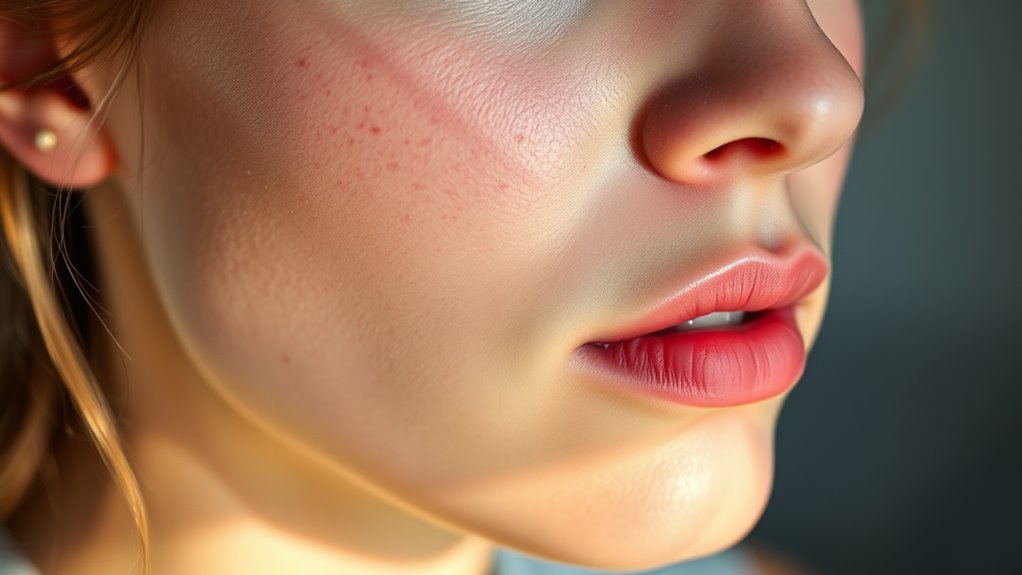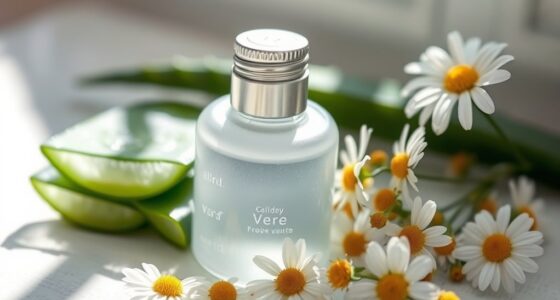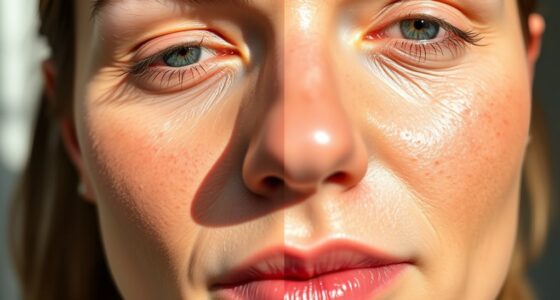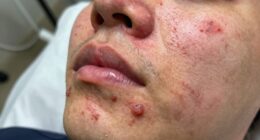Hormonal acne can mess with your face because of fluctuating hormone levels, especially during your menstrual cycle. When estrogen drops before your period, your body produces more sebum, leading to breakouts, particularly on your jawline and chin. Factors like stress and diet can worsen these fluctuations, making it crucial to manage your lifestyle. By understanding how your cycle impacts your skin, you can take proactive steps for clearer skin. There’s more to explore on this topic!
Key Takeaways
- Hormonal fluctuations during the menstrual cycle, particularly drops in estrogen, can trigger increased oil production and acne breakouts.
- Breakouts commonly occur on the jawline, chin, and lower face, aligning with hormonal peaks and drops.
- Elevated androgen levels during certain life stages, like puberty and menstruation, contribute to higher oil production and clogged pores.
- Stress and poor dietary choices, such as high sugar and dairy intake, can exacerbate hormonal acne by disrupting hormonal balance.
- A holistic approach combining lifestyle changes, skincare routines, and potential medical treatments can effectively manage hormonal acne.
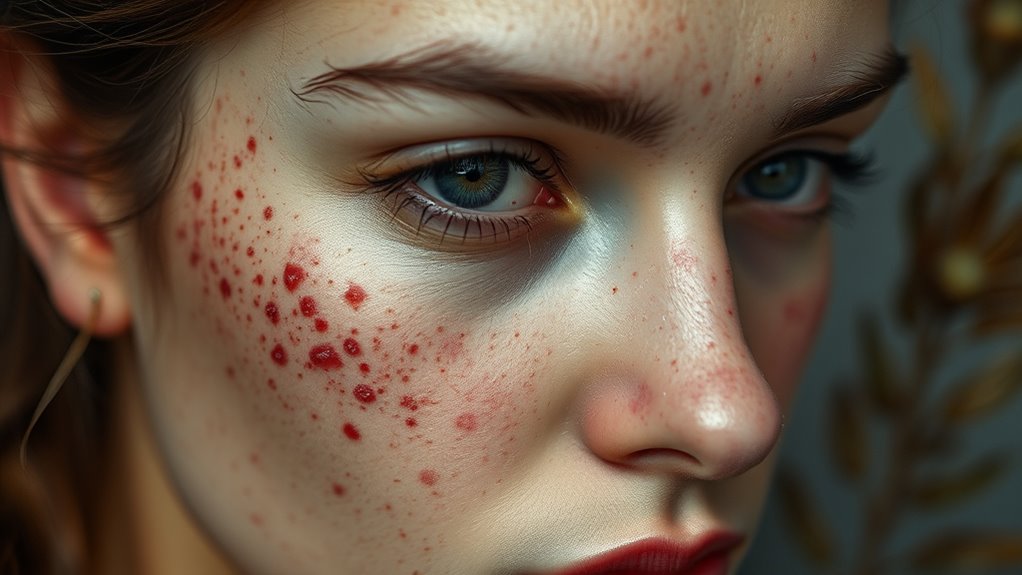
Hormonal acne can be frustrating, especially when it flares up during hormonal shifts like your menstrual cycle or pregnancy. This type of acne is triggered by fluctuations in hormones, most commonly affecting women between the ages of 13 and 50. You might notice that your breakouts are tied to your menstrual cycle, with acne often appearing just before or during your period. Androgens, estrogen, and progesterone all play a role in the appearance of hormonal acne, making it a complex issue to tackle.
During your menstrual cycle, estrogen levels fluctuate significantly. Mid-cycle, when estrogen peaks, you may find that your skin is clearer, as higher estrogen levels can reduce sebum production. However, as estrogen drops before your period, sebum production often spikes, leading to clogged pores and breakouts. It’s important to remember that hormonal fluctuations in women can occur during various life stages and not just in relation to menstruation. Additionally, essential oils like tea tree oil can provide natural antibacterial and antifungal properties that may support your skin’s health, while essential oils for skin health can enhance overall skin vitality. Drinking herbal teas can also promote relaxation and reduce stress, which may help mitigate hormonal fluctuations.
Estrogen levels fluctuate during your cycle, influencing sebum production and leading to breakouts just before your period.
You might also find that your acne appears in the same locations each month, such as on your jawline, chin, and lower face, making it predictable yet frustrating.
In addition to menstrual cycles, other hormonal peaks during puberty, pregnancy, and menopause can trigger similar breakouts. If you have conditions like Polycystic Ovary Syndrome (PCOS), hormonal imbalances can lead to even more severe acne. Elevated androgen levels can increase oil production, further contributing to clogged pores and inflamed skin.
Stress and lifestyle factors can also exacerbate hormonal acne. When you’re stressed, your cortisol levels rise, which can disrupt your hormonal balance and worsen breakouts. Diet plays a crucial role too. Foods high in sugar and dairy can lead to increased oil production and inflammation, making your acne worse.
Incorporating non-comedogenic skincare products into your routine can help manage the situation, but you also need to consider your overall lifestyle.
To treat hormonal acne effectively, you might want to explore various options. Topical treatments like salicylic acid and retinoids can help manage breakouts, while oral contraceptives can balance your hormones and clarify your skin. Anti-androgen medications can reduce male hormone levels, diminishing oil production.
For a more natural approach, consider remedies like tea tree oil, which have anti-inflammatory properties. Essential oils can enhance the effectiveness of traditional treatments and may improve overall skin health.
Understanding how your cycle influences your skin can empower you to take action. By addressing both internal hormonal issues and external factors, you can develop a holistic approach to managing hormonal acne.
Frequently Asked Questions
Can Diet Affect Hormonal Acne Severity?
Yes, your diet can affect hormonal acne severity. Consuming high-glycemic foods or dairy might increase insulin levels, which could worsen your acne.
If you eat a lot of sugary or fatty products, you may notice more breakouts.
On the flip side, focusing on a low-glycemic diet, antioxidant-rich foods, and omega-3 fatty acids can help manage your acne.
Are There Specific Skincare Ingredients to Avoid?
When managing your skin, it’s crucial to avoid certain skincare ingredients.
Steer clear of Sodium Lauryl Sulfate, as it can strip your skin’s natural oils and lead to irritation.
Alcohol can dry your skin out, prompting excess oil production.
Synthetic fragrances often cause allergic reactions, while parabens may disrupt hormone balance.
Lastly, mineral oil can clog your pores, worsening breakouts.
Opt for non-comedogenic products to help keep your skin clear and healthy.
How Does Stress Impact Hormonal Acne?
Stress impacts your hormonal acne in several ways: it triggers hormone release, boosts oil production, and heightens inflammation.
When you’re stressed, your body releases cortisol, which can worsen your acne. You might notice that breakouts increase during hectic times, as stress aggravates existing conditions.
Managing your stress through mindfulness, exercise, and proper sleep can significantly improve your skin’s health and reduce the frequency and severity of acne flare-ups.
Can Hormonal Acne Occur in Men?
Yes, hormonal acne can definitely occur in men.
When your testosterone levels fluctuate, it can lead to increased oil production, clogging your pores and causing breakouts. You might notice these breakouts along your jawline, chin, and neck.
Stress, diet, and lifestyle choices can also exacerbate the situation.
If you experience painful cysts or persistent acne, it’s a good idea to consult a healthcare professional for tailored advice and treatment options.
What Lifestyle Changes Help Reduce Hormonal Acne?
Imagine waking up to clear skin, free from the stress of hormonal acne.
To achieve this, start by adjusting your diet—cut back on high GI foods and sugar, and load up on omega-3s and probiotics.
Don’t forget to stay hydrated! Incorporate gentle skincare routines and consider supplements like zinc and omega-3s.
Exercise regularly and manage stress.
These lifestyle changes can transform your skin, helping you feel confident and radiant.
Conclusion
So, it turns out your body’s natural rhythm is the sneaky culprit behind those pesky breakouts. Just when you think you’ve got your skin under control, your hormones decide to throw a party. Isn’t it ironic that the very thing that makes you feel beautiful can also make your skin rebel? But hey, understanding your cycle is half the battle. Embrace the chaos, and remember: you’re not alone in this hormonal rollercoaster ride!
